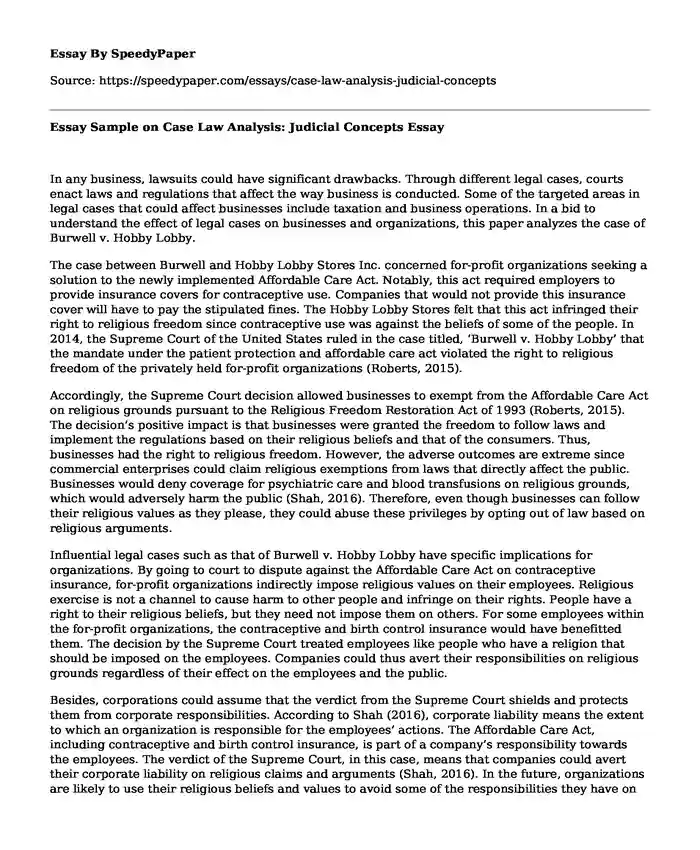
| Type of paper: | Essay |
| Categories: | Court system Judicial system |
| Pages: | 3 |
| Wordcount: | 713 words |
In any business, lawsuits could have significant drawbacks. Through different legal cases, courts enact laws and regulations that affect the way business is conducted. Some of the targeted areas in legal cases that could affect businesses include taxation and business operations. In a bid to understand the effect of legal cases on businesses and organizations, this paper analyzes the case of Burwell v. Hobby Lobby.
The case between Burwell and Hobby Lobby Stores Inc. concerned for-profit organizations seeking a solution to the newly implemented Affordable Care Act. Notably, this act required employers to provide insurance covers for contraceptive use. Companies that would not provide this insurance cover will have to pay the stipulated fines. The Hobby Lobby Stores felt that this act infringed their right to religious freedom since contraceptive use was against the beliefs of some of the people. In 2014, the Supreme Court of the United States ruled in the case titled, ‘Burwell v. Hobby Lobby’ that the mandate under the patient protection and affordable care act violated the right to religious freedom of the privately held for-profit organizations (Roberts, 2015).
Accordingly, the Supreme Court decision allowed businesses to exempt from the Affordable Care Act on religious grounds pursuant to the Religious Freedom Restoration Act of 1993 (Roberts, 2015). The decision’s positive impact is that businesses were granted the freedom to follow laws and implement the regulations based on their religious beliefs and that of the consumers. Thus, businesses had the right to religious freedom. However, the adverse outcomes are extreme since commercial enterprises could claim religious exemptions from laws that directly affect the public. Businesses would deny coverage for psychiatric care and blood transfusions on religious grounds, which would adversely harm the public (Shah, 2016). Therefore, even though businesses can follow their religious values as they please, they could abuse these privileges by opting out of law based on religious arguments.
Influential legal cases such as that of Burwell v. Hobby Lobby have specific implications for organizations. By going to court to dispute against the Affordable Care Act on contraceptive insurance, for-profit organizations indirectly impose religious values on their employees. Religious exercise is not a channel to cause harm to other people and infringe on their rights. People have a right to their religious beliefs, but they need not impose them on others. For some employees within the for-profit organizations, the contraceptive and birth control insurance would have benefitted them. The decision by the Supreme Court treated employees like people who have a religion that should be imposed on the employees. Companies could thus avert their responsibilities on religious grounds regardless of their effect on the employees and the public.
Besides, corporations could assume that the verdict from the Supreme Court shields and protects them from corporate responsibilities. According to Shah (2016), corporate liability means the extent to which an organization is responsible for the employees’ actions. The Affordable Care Act, including contraceptive and birth control insurance, is part of a company’s responsibility towards the employees. The verdict of the Supreme Court, in this case, means that companies could avert their corporate liability on religious claims and arguments (Shah, 2016). In the future, organizations are likely to use their religious beliefs and values to avoid some of the responsibilities they have on the employees, which would adversely influence the workers.
In conclusion, the case between Burwell and Hobby Lobby Stores Inc. concerns for-profit organizations seeking a solution that will influence the companies and their workers on religious tenets. The case described above is a result of the new regulations provided in the affordable care act, which requires employers to provide insurance cover for contraceptive use. The Hobby Lobby Stores complained that the act was a violation of their religious freedom. The court ruled in favor of Hobby Lobby Stores and for-profit organizations. Mainly, this case implies that companies can avert their responsibilities to the employees based on religious claims.
References
Roberts, J. L. (2015). An alternate theory of Burwell v. Hobby Lobby. Connecticut Insurance Law, 22(1), 84-119. https://opencommons.uconn.edu/cgi/viewcontent.cgi?article=1149&context=cilj
Shah, H. (2016). Aftermath of the Hobby Lobby decision: Implications for women in the workforce. Auctus: The Journal of Undergraduate Research and Creative Scholarship, 1-12. https://scholarscompass.vcu.edu/cgi/viewcontent.cgi?article=1049&context=auctus
Cite this page
Essay Sample on Case Law Analysis: Judicial Concepts. (2023, Nov 03). Retrieved from https://speedypaper.net/essays/case-law-analysis-judicial-concepts
Request Removal
If you are the original author of this essay and no longer wish to have it published on the SpeedyPaper website, please click below to request its removal:
- Essay Example on External Sustainability Reporting and Verification
- Who's Running This Organization Anyway, Law Essay Example
- Free Essay. How the Convict Labor System Was Worse Than Slavery
- Essay Sample on The Verve: Bittersweet Symphony
- Free Essay: Advocacy for English Language Learners Students
- Paper Example on Comparing Business Organizational Forms: Partnerships, Corporations, and LLCs
- Exploring the OSHA Citations and Penalties for Workplace Safety Violations - Free Paper Sample
Popular categories




